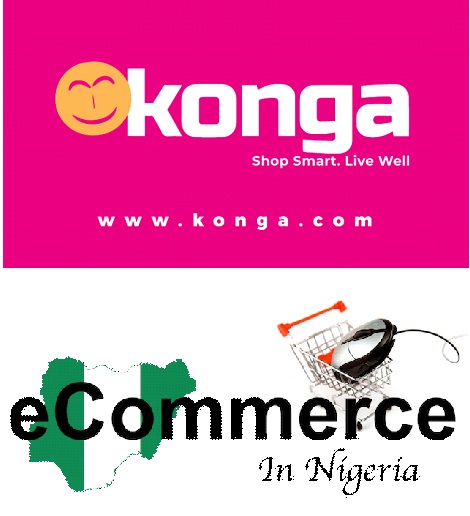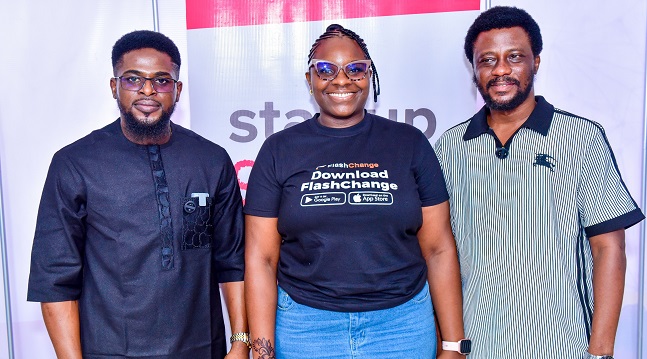News
How Konga is Bridging E-Commerce Gap for Millions of Unreached, Under-Served Nigerians

For a population of over 190 million, it is perhaps shocking to countenance the fact that about 70% of Nigerians – a whopping 130 million – are still skeptical of shopping online and yet to be captured in the e-Commerce net – an anomaly that Konga’s futuristic business model is gradually catering to.
According to latest estimates from the United Nations Conference on Trade and Development (UNCTAD), the global e-commerce market is worth around $22.1 trillion.
Data from research firm Statista also indicates that e-Commerce in Africa accounted for $16.5 billion in revenue in 2017, with forecasts estimating revenue in the sector to gross the $29 billion mark by 2022.
Interestingly, Africa’s share of the global e-commerce market is expected to grow even more significantly in the years ahead, backed by factors such as increasing levels of literacy, fall in average smartphone prices, mobile adoption, growing internet penetration and innovative payment solutions.
The foregoing has seen projections of Africa as the next emerging market to make significant strides in online shopping.
Perhaps justifying its status as the continent’s biggest market and most populous country, Nigeria is further estimated to play home to about 40% of the continent’s e-Commerce ventures within its shores – a positive development that has, nevertheless, failed in ensuring that the bulk of the country’s under-served or unreached millions partake in the e-Commerce revolution.
A number of factors are responsible for the current state of affairs.
Despite the sweeping changes caused by the e-Commerce bug which has bitten a lot of savvy Nigerians, shopping in Nigeria is still largely traditional and the issue of trust has further hindered the pace of growth.
Further adding to the dire situation is the sheer proportion of Nigerians who are left out of the equation.
Indeed, to millions of Nigerians who reside outside the cosmopolitan cities such as Lagos, Abuja and Port Harcourt, for instance, online shopping is a hard sell.
Through a realistic and well-thought out business model, Konga is gradually changing the narrative in the following ways:
Growing chain of nationwide physical retail stores: With over 30 brick-and-mortar stores spread nationwide and many more springing up all over Nigeria’s vast landscape, Konga has given millions of unreached Nigerians a reason to smile. A bold, ambitious plan to spread its tentacles across the length and breadth of the nation, with the establishment of at least one store in each of Nigeria’s 774 local government areas, will unleash the power of the country’s booming population and see e-Commerce finally achieving its huge potential in Nigeria and beyond.
Improved Logistics means swift delivery: Through Kxpress, its in-house logistics company, Konga boasts a considerable and growing fleet of line-haul trucks, vans, buses and motorbikes through which it has bridged the distance between the average shopper in the hinterlands and a taste of the e-commerce experience. Kxpress not only handles last-mile deliveries but has also received huge investment which has expanded its network. Also available are pick-up points and distribution centres in every part of Nigeria, further ensuring that more Nigerians can join the e-Commerce train.
Suite ofCutting-edge Payment Solutions: Riding on KongaPay, an internally-owned Central Bank of Nigeria (CBN) licensed payment system — Konga offers all classes of Nigerians a secure and reliable e-wallet that works with all banks in Nigeria. The app ensures that the customer’s money is held in escrow until a sales transaction is completed successfully. Through strategic partnerships with world-class payment solutions providers such as Visa, Konga has also ensured that this recurring pain-point is becoming a thing of the past. It is, however, through the other options it offers shoppers that Konga has distinguished itself. These include payment on delivery which it re-introduced in August 2018, payment on pick-up of items and cash payment in all of its stores nationwide.
Opportunity to self-fulfil: Nigerians love the physical touch that an offline or brick-and-mortar store offers. Through its nationwide network of retail stores, Konga has given millions of skeptical or under-served Nigerians a platform on which to play an active participatory role in e-Commerce. Shoppers in all nooks and crannies of Nigeria can visit a Konga store of their choice to pay and collect any item of their choice, while for many others, the store represents a useful pick-up location for self-fulfilling their online orders. What’s more, a visitor to any of the stores can choose to place an order for a physically unavailable item(s) for delivery to their homes/locations or personally pick-up at a later date.
News
TeamApt, Awabah Partner to Boost Pension Drive for Nigerians

TeamApt Ltd., a subsidiary of Moniepoint Inc. and a leading financial infrastructure provider, has partnered with Awabah, the National Pension Commission’s first licensed Accredited Pension Agent, to expand pension access for millions of Nigerians in the informal economy.

The partnership was unveiled in Abuja at the launch of Awabah’s agent licence, themed “Building Financial Resilience: Securing the Future with Personal Pensions.”
At the event, PenCom Director-General Omolola Oloworaran underscored a major imbalance in Nigeria’s pension system, noting that while pension assets have grown to over ₦27 trillion, the benefits remain largely concentrated among formal-sector workers. She observed that most informal-sector workers—who make up the majority of Nigeria’s workforce—still retire without any form of savings.
This challenge is further highlighted in Moniepoint’s 2025 Informal Economy Report, which reveals that although 65 per cent of informal businesses recorded revenue growth, most lack the structural resilience required for long-term sustainability and succession.
Through the partnership, TeamApt—a Central Bank of Nigeria–licensed switching and processing company—will enable seamless pension registration and contributions for Awabah users via its Direct Debit service on Point of Sale (POS) terminals nationwide. Informal workers can enrol for personal pensions, tokenize their cards, and automate periodic contributions in just a few steps.
The initiative simplifies pension savings by turning what was once a complex, bureaucratic process into a routine transaction, enabling business owners and workers to build financial security beyond their productive years.
“When we started Awabah, we were driven by one core belief—that no African worker should be one accident or crisis away from poverty,” said Tunji Andrews, Chief Executive Officer of Awabah.
“This partnership with TeamApt allows us to scale that vision. By leveraging their Direct Debit service and extensive POS network, we are meeting informal workers where they already operate—markets, workshops, kiosks, and roadside businesses. With small, regular contributions, workers can now access personal pensions bundled with health, accident, and life insurance,” he added.
TeamApt CEO Dennis Ajalie said the collaboration aligns with the company’s long-standing mission to power Nigeria’s informal economy.
“At TeamApt and Moniepoint Inc., our focus has always been on enabling the informal sector,” Ajalie said. “Today, working within our licence framework and alongside our co-subsidiary, Moniepoint Microfinance Bank, we operate across all 774 local government areas, serving millions of Nigerians who drive economic activity.”
He described the partnership as a critical step toward pension inclusion, adding that it demonstrates how financial infrastructure can deliver real, long-term value to everyday Nigerians.
Ajalie also praised PenCom’s leadership for creating an enabling environment for innovation, noting that Oloworaran’s reforms have opened the door for partnerships capable of delivering sustainable pension coverage for informal workers.
The initiative is powered by TeamApt’s robust financial technology ecosystem, which has supported banks, fintechs, and financial institutions for more than a decade. Its omni-channel Direct Debit service allows automated recurring collections—such as pension contributions, subscriptions, and repayments—directly from customers’ bank accounts with their consent.
Beyond pensions, the platform enables informal workers to automate investments in the capital market, access healthcare through HMOs, and secure insurance coverage for themselves and their families—extending financial security far beyond retirement.
News
FlashChange CEO, Bidemi Oke, Urges Startups to Build Strong Governance Structures Early

FlashChange, Africa’s fast-rising digital asset management and cross-border payment platform, had its Chief Executive Officer, Bidemi Oke, featured as a speaker at the latest edition of Startup Grind Lagos, one of the largest global communities for entrepreneurs and innovators.

Held on Saturday, February 28, 2026 in Lagos, the event convened founders, investors, developers, and ecosystem builders for a candid conversation on innovation, resilience, and scaling technology ventures in emerging markets. Oke shared insights from FlashChange’s journey building a trusted digital finance brand in Nigeria’s evolving fintech and crypto landscape.
During the fireside chat, Oke shared practical lessons from scaling FlashChange in a highly regulated and fast-changing environment. He emphasized the need for startups to build strong governance structures early, maintain open communication with regulators, and design solutions that solve real economic pain points, particularly around remittances, foreign exchange access, and digital asset utility.
“In markets like Nigeria, trust is not a marketing slogan, it is the product,” Oke said: “For us at FlashChange, growth has always been tied to transparency, compliance, and delivering consistent value to users navigating cross-border payments and digital assets.”
He also addressed the broader opportunity within Africa’s fintech ecosystem, noting that innovation on the continent must balance speed with responsibility.
“The next phase of African fintech will be defined not just by who grows fastest, but by who earns and keeps user confidence. Founders must think beyond valuation headlines and focus on building institutions, he added”
“Innovation is important, but sustainability is critical. At FlashChange, we are building for the long term” Oke noted.”
The session featured an interactive Q&A session where participants engaged him on several topical issues. He underscored the importance of proactive communication, especially in industries where misinformation and volatility can quickly erode public confidence.
Startup Grind Lagos Director, Mayokun Adeoti while commending Oke for offering practical, founder-focused insights, he said, “His experience provides valuable lessons for startups building in complex regulatory environments.”
FlashChange has continued to position itself as a reputable voice within Nigeria’s fintech and digital asset ecosystem, advocating for regulatory clarity, financial literacy, and secure transaction infrastructure. The company’s participation in Startup Grind Lagos reflects its commitment to contributing meaningfully to conversations shaping the future of innovation in Nigeria.
The Startup Grind Lagos appearance marks another milestone in FlashChange’s thought leadership journey and reinforces its growing role in Nigeria’s digital finance ecosystem.
News
Galaxy Backbone Confirms Over 150,000 Active Official Government Email Accounts, Clarifies Status of GOVMAIL

Galaxy Backbone Limited (GBB), Nigeria’s foremost ICT infrastructure and shared services provider to the Federal Government, wishes to reiterate and clarify the availability, maturity, and ongoing expansion of the Federal Government’s official email infrastructure, widely known as GOVMAIL.

GOVMAIL is a secure and centralized official email platform established for use by Ministries, Departments, and Agencies (MDAs) to facilitate professional, auditable, and efficient communication across all arms of government.
The platform was launched by the Office of the Head of the Civil Service of the Federation, Mrs, Didi Esther Walson-Jack as part of a broader digital transformation agenda aimed at modernizing public service workflows and reducing reliance on paper-based correspondence and fragmented, external email services.
Recent statements by the Head of the Civil Service of the Federation, Mrs. Didi Esther Walson-Jack, underscore the strategic importance of GOVMAIL in the wider push towards a paperless civil service.
In late 2025, she announced that over 100,000 official GOVMAIL accounts had been created for civil servants across federal MDAs under an expanding paperless policy and that the transformation reflects a clear shift away from traditional paper correspondence to secure digital communication at scale. Today, that number has grown to over 150,000 Official government email accounts, current in use by government workers across MDAs.
Galaxy Backbone also affirms that these email accounts operate within a protected sovereign government domain environment hosted on secure local infrastructure, supported by enterprise-grade cybersecurity architecture.
The platform underpins centralized identity management and ensures compliance with national data protection standards, reinforcing accountability, audit-trail visibility, and overall digital governance efficiency.
In addition to GOVMAIL, Galaxy Backbone operates secure national Tier III and Tier IV Data Centres, a robust National Fibre Backbone, a Security Operations Centre (SOC), and a Network Operations Centre (NOC) that jointly power mission-critical government digital services. This infrastructure is closely aligned with the Federal Government’s digital economy strategy and its efforts to deepen digital service delivery, transparency, and efficiency across MDAs.
To accelerate adoption and ensure that every government worker who is expected to have an official email has one, GBB is working collaboratively with MDAs to close existing gaps and onboard remaining staff within the shortest possible time. These coordinated efforts reflect the shared objective of equipping public servants with the digital tools necessary for responsive, efficient, and secure inter-agency communication.
Galaxy Backbone remains committed to working with stakeholders across the different arms of government to sustain and build on this progress. The company appreciates the emphasis placed on strengthening digital governance and remains ready to provide technical clarifications and support collaborative engagements that further advance Nigeria’s digital public service ecosystem.

 General News3 days ago
General News3 days agoMore 14m Farmers to Benefit from AfDB-backed Initiative

 Telecom3 days ago
Telecom3 days agoMTN Nigeria Posts Record N1.70 Trillion Pre‑Tax Profit, Declares N20 Dividend for 2025

 Telecom3 days ago
Telecom3 days agoDimension Data Nigeria Secures ₦20Billion Funding to Strengthen Digital Infrastructure

 News3 days ago
News3 days agoGalaxy Backbone Confirms Over 150,000 Active Official Government Email Accounts, Clarifies Status of GOVMAIL

 Telecom3 days ago
Telecom3 days agoAlerzo Liquidates Delivery Fleet as N4.38bn Moniepoint Loan Row Deepens

 General News3 days ago
General News3 days agoNewmark Webinar Explores How AI Could Transform Healthcare in Africa

 General News17 hours ago
General News17 hours agoSERAP Asks FCCPC to Investigate Google, Meta, Others over Alleged Rights Abuses

 E-Financial16 hours ago
E-Financial16 hours agoIran-Israel-US Conflict and CBN’s FX Gains: A Stress Test for Nigeria’s Monetary Stability

























